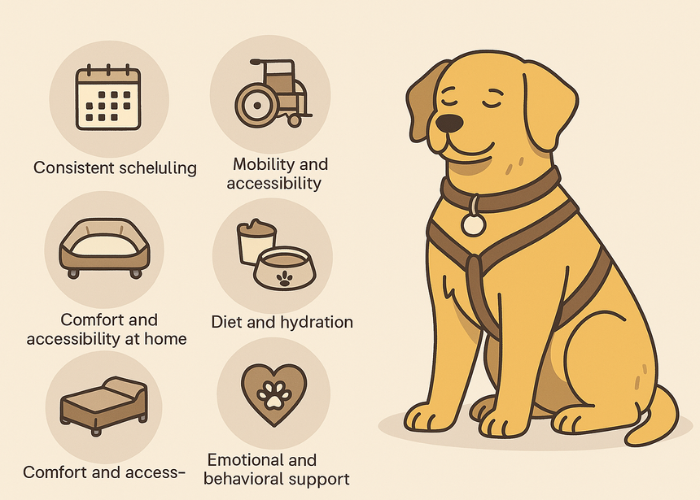Owning a dog is about so much more than companionship and playtime. According to a growing body of scientific research, sharing your life with a dog can significantly improve your physical, emotional, and mental health—and may even help you live longer.
In this article, we’ll explore the science behind the many benefits of having a dog, from reduced stress levels and improved fitness to increased happiness and enhanced immune function.
😊 1. Dogs Make People Happier
One of the most immediate benefits of having a dog is the boost to your emotional well-being. Studies show that interacting with dogs increases levels of oxytocin—the “love hormone”—which helps strengthen the bond between pets and their owners while promoting feelings of joy, connection, and calm.
Spending time with your dog—whether playing, walking, or simply cuddling—can improve your mood, reduce feelings of loneliness, and help you manage daily emotional stressors more effectively.
💡 Tip: Try setting aside 15 minutes a day for one-on-one time with your dog. The emotional connection can be deeply therapeutic for both of you.
🧘♀️ 2. Stress and Anxiety Reduction
Research has found that being around dogs can lower cortisol levels (the stress hormone), decrease heart rate, and reduce blood pressure. The act of petting a dog can trigger a relaxation response in the body, helping you feel more grounded and present.
🐾 Even short interactions with a dog—like a few minutes of petting or playing—can produce measurable reductions in stress and anxiety levels.
💡 Tip: Try integrating your dog into your mindfulness or relaxation routine. A walk together can double as moving meditation.
🚶 3. Dogs Encourage Physical Activity and Social Interaction
Caring for a dog naturally leads to a more active lifestyle. Dogs need daily walks, playtime, and stimulation—all of which help their humans stay physically fit and engaged with the world around them.
Pet owners are also more likely to engage in casual social interactions. Dog parks, walking trails, and training classes often lead to new friendships and increased community engagement.
💡 Tip: Join a local dog-walking group or attend pet-friendly events to boost your physical activity and expand your social circle.
🧠 4. Mental Health Support
Dogs provide emotional stability, routine, and a sense of purpose—particularly helpful for individuals dealing with depression, grief, or chronic anxiety. The simple responsibility of feeding, walking, and caring for a pet offers structure and meaning.
For many, a dog can be a constant, nonjudgmental source of companionship, making them excellent emotional support animals.
💡 Tip: Incorporate daily rituals with your dog (like morning walks or evening cuddle sessions) to create emotional grounding.
❤️ 5. Dogs May Help You Live Longer
Several long-term studies have found a strong correlation between dog ownership and longevity. Dog owners are less likely to suffer from heart disease, stroke, and high blood pressure. The combination of daily movement, reduced stress, and consistent companionship creates a healthier overall lifestyle.
A study published in the journal Circulation found that dog owners had a 24% reduced risk of death from any cause compared to non-dog owners.
💡 Tip: Treat your dog’s care routine as part of your own wellness plan—daily walks benefit both heart and soul.
🛡️ 6. Strengthened Immune System
Research suggests that children who grow up around dogs have a lower risk of developing allergies and asthma, due to early exposure to a wider variety of bacteria. Even adults may benefit from enhanced immune regulation thanks to regular contact with dogs, which has been linked to lower inflammation markers.
🐶 Living with a dog means constant low-level immune stimulation, which can build resilience against illness.
💡 Tip: Let your dog be part of everyday life—including outdoor play and indoor companionship—to promote a healthy microbiome in your home.
👥 7. Companionship and Reduced Loneliness
Dogs are incredible companions, offering unwavering emotional support and affection. For individuals who live alone or are going through difficult life transitions, a dog can provide comfort, routine, and connection—helping fill emotional gaps that might otherwise lead to feelings of isolation.
🐾 Dogs are especially valuable for seniors, remote workers, or those recovering from loss.
💡 Tip: Make your dog part of your daily routine—meals, walks, rest—and you’ll naturally feel more anchored and emotionally supported.
🧬 Final Thoughts: Dogs Truly Enrich Our Lives
The science is clear: having a dog is good for your health, physically, mentally, and emotionally. From lower stress levels and increased physical activity to better mental health and even a longer life span, the benefits of canine companionship are both measurable and profound.
If you’re considering adopting a dog, know that you’re not just gaining a pet—you’re inviting more love, structure, and well-being into your life. Dogs are more than friends—they’re health allies, stress relievers, motivators, and loyal companions all in one.
❓ FAQ – Frequently Asked Questions About the Health Benefits of Having a Dog
1. How does having a dog reduce stress?
Dogs help lower cortisol (the stress hormone) and increase oxytocin, the hormone linked to bonding and calm. Even petting a dog can reduce anxiety and elevate mood.
2. Can having a dog help me live longer?
Yes! Studies have shown that dog owners have a reduced risk of heart disease, high blood pressure, and stroke—all of which contribute to longer life expectancy.
3. Do dogs really help with depression and anxiety?
Absolutely. Dogs provide unconditional love, routine, and physical contact, all of which can help reduce the symptoms of depression and anxiety disorders.
4. How do dogs promote physical health?
Dogs encourage their owners to walk, play, and stay active regularly. This promotes cardiovascular health, better mobility, and increased energy levels.
5. Can a dog help reduce loneliness?
Yes. Dogs offer constant companionship and help owners feel emotionally connected and less isolated, especially for people who live alone or are socially withdrawn.



